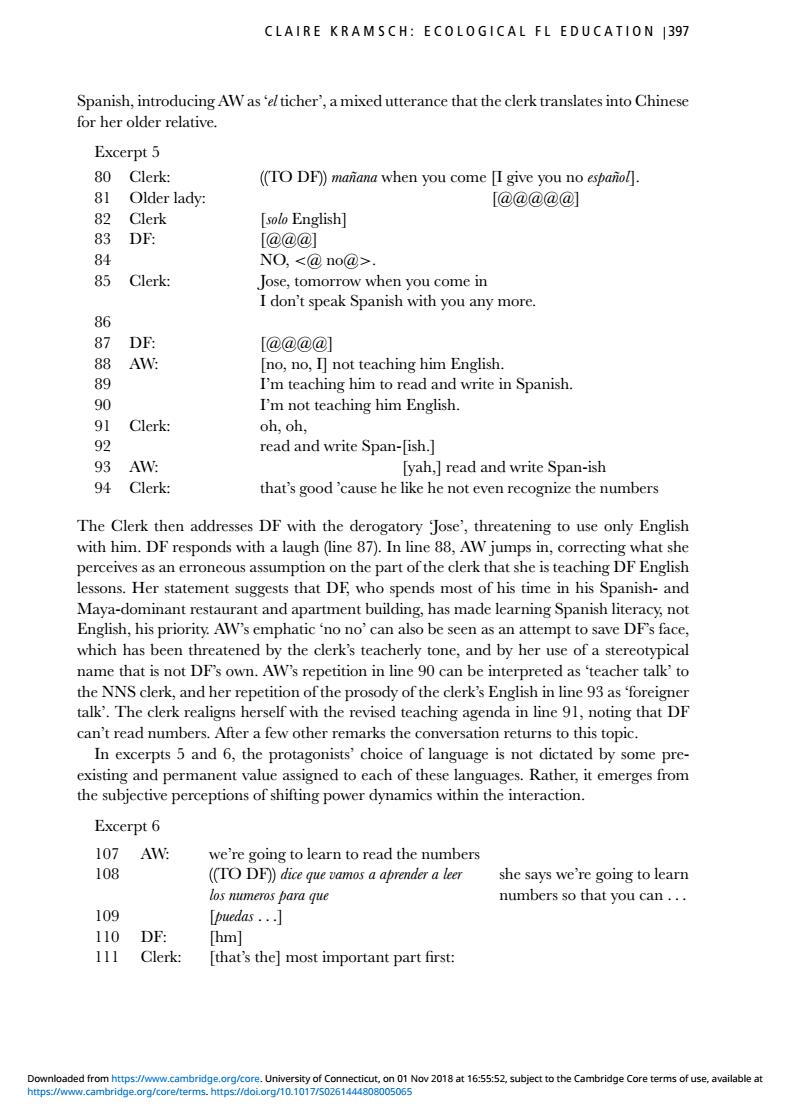正在加载图片...

CLAIRE KRAMSCH:ECOLOGICAL FL EDUCATION 397 Spanish,introducing AW as'eticher,a mixed utterance that the clerk translates into Chines for her older relative Excerpt 5 80 Clerk ((TO DF)mariana when you come [I give you no espaiol] 81 Older lady @aa@@ 82 Clerk solo English] 83 DE: @@@ NO.<no@> 85 Clerk Jose,tomo come in with you any more 87 DF: [@@@@] 88 AW: [no,no,II not teaching him English I'm teaching him to read and write in Spanish 90 I'm not teaching him English. Clerk: oh,oh read and write Span-[ish.] AW [yah,read and write Span-ish 94 Clerk: that's good'cause he like he not even recognize the numbers The Clerk then addresses DF with the derogatory 'Jose',threatening to use only English DF responds with a laugh (ine in correcting wh ous assu on the he is teaching DF English ons.Her statement suggests that DE who spends most of his time in his Spanish-and Maya-dominant restaurant and apartment building,has made learning Spanish literacy,not English,his priority.AW's emphatic 'no no'can also be seen as an attempt to save DFs face, which has been threatened by the clerk's teacherly tone,and by her use of a stereotypical name that is not DF's own.AW's repetition in line 90 can be interpreted as'teacher talk'to r repet pr dy of the clerk's E e 93 as for c revised tcachingd in noting h Dp can't read numbers.After a few other remarks the conversation returns to this topic In excerpts 5 and 6,the protagonists'choice of language is not dictated by some pre existing and permanent value assigned to each of these languages.Rather,it emerges from the subjective perceptions of shifting power dynamics within the interaction Excerpt 6 18g N she says we're going to learn los mmmeros para qu numbers so that you can. 109 puedas . 110DE: 111 Clerk: that's the]most important part first 0op%2eorip50geetrmeog2y8oetn7t5gTeitm0Nov2018ti6552subectothecambdecoreemsofuseavailbet CLAIRE KRAMSCH: ECOLOGICAL FL EDUCATION 397 Spanish, introducing AW as ‘el ticher’, a mixed utterance that the clerk translates into Chinese for her older relative. Excerpt 5 80 Clerk: ((TO DF)) manana ˜ when you come [I give you no espanol ˜ ]. 81 Older lady: [@@@@@] 82 Clerk [solo English] 83 DF: [@@@] 84 NO, <@ no@>. 85 Clerk: Jose, tomorrow when you come in I don’t speak Spanish with you any more. 86 87 DF: [@@@@] 88 AW: [no, no, I] not teaching him English. 89 I’m teaching him to read and write in Spanish. 90 I’m not teaching him English. 91 Clerk: oh, oh, 92 read and write Span-[ish.] 93 AW: [yah,] read and write Span-ish 94 Clerk: that’s good ’cause he like he not even recognize the numbers The Clerk then addresses DF with the derogatory ‘Jose’, threatening to use only English with him. DF responds with a laugh (line 87). In line 88, AW jumps in, correcting what she perceives as an erroneous assumption on the part of the clerk that she is teaching DF English lessons. Her statement suggests that DF, who spends most of his time in his Spanish- and Maya-dominant restaurant and apartment building, has made learning Spanish literacy, not English, his priority. AW’s emphatic ‘no no’ can also be seen as an attempt to save DF’s face, which has been threatened by the clerk’s teacherly tone, and by her use of a stereotypical name that is not DF’s own. AW’s repetition in line 90 can be interpreted as ‘teacher talk’ to the NNS clerk, and her repetition of the prosody of the clerk’s English in line 93 as ‘foreigner talk’. The clerk realigns herself with the revised teaching agenda in line 91, noting that DF can’t read numbers. After a few other remarks the conversation returns to this topic. In excerpts 5 and 6, the protagonists’ choice of language is not dictated by some preexisting and permanent value assigned to each of these languages. Rather, it emerges from the subjective perceptions of shifting power dynamics within the interaction. Excerpt 6 107 AW: we’re going to learn to read the numbers 108 ((TO DF)) dice que vamos a aprender a leer los numeros para que she says we’re going to learn numbers so that you can . 109 [puedas .] 110 DF: [hm] 111 Clerk: [that’s the] most important part first: https://www.cambridge.org/core/terms. https://doi.org/10.1017/S0261444808005065 Downloaded from https://www.cambridge.org/core. University of Connecticut, on 01 Nov 2018 at 16:55:52, subject to the Cambridge Core terms of use, available at